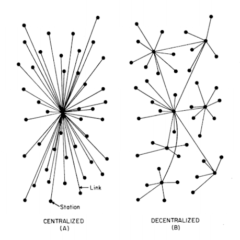David Bohm, 2005 (orig. 1980)
Original approach to a vaguely postmodern area of philosophy by a renowned physicist. Highly insightful and rare for its clear language. Contains some equations and discussions of quantum theory.
Excerpts
Chapter 3: Reality and Knowledge when Considered as Process
4 Thought and non-thought
While it is thus clear that ultimately thought and thing cannot properly be analysed as separately existent, it is also evident that in man’s immediate experience some such analysis and separation has to be made, at least provisionally, or as a point of departure.It is useful here to consider how such a distinction may have arisen. It is well known, for example, that a young child often finds it difficult to distinguish the contents of his thought from real things
T is not NT (thought and non-thought are different andmutually exclusive).All is either T or NT (thought and non-thought cover thewhole of what can exist).
Thus, non-thought is commonly identified with reality, in the sense of thinghood.
Further characteristic distinctions are that real things may be palpable, stable, resistant to attempts to change them, sources of independent activity throughout the whole of reality.
other hand, thoughts may be regarded as mere ‘mental stuff’, impalpable, transient, easily changed, and not capable of initiating independent lines of activity outside of themselves.

This cyclical (or spiral) movement, in which thought has its full actual and concrete existence, includes also the communication of thoughts between people (who are parts of each other’s environment) and it goes indefinitely far into the past.
5 The field of knowledge, considered as process
as we have seen, in thought that aims to have totality as its content it is much harder to have such clarity, on the one hand because this thought is so intense, continuous and total that it gives a strong impression of reality, and on the other hand because there are no sensuously perceivable ‘things’ against which it could be tested. It is thus quite easy, through inadequate attention to the actual process of one’s thought, to ‘slip into’ a form of conditioned response of memory, in which one is not alert to the fact that is still only a form of thought, a form that aims to give a view of ‘the whole of reality’. So, ‘by default’ one falls into the trap of tacitly treating such a view as originating independently of thought, thus implying that its content actually is the whole of reality.
Scientific American on Bohm
Some scientists seek to clarify reality, others to mystify it. David Bohm seemed driven by both impulses. He is renowned for promoting a sensible (according to Einstein and other experts) interpretation of quantum mechanics. But Bohm also asserted that science can never fully explain the world, and his 1980 book Wholeness and the Implicate Order delved into spirituality.
https://blogs.scientificamerican.com/cross-check/david-bohm-quantum-mechanics-and-enlightenment/
